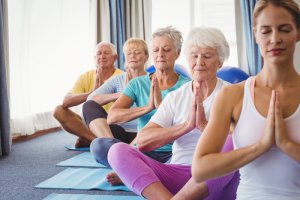Top 10 Tips – Staying Healthy in Old Age
Top 10 Tips on Staying Healthy in Old Age – Presented by Affordable Mobility

Although we may want things to be different, one thing that is inevitable in life is the ageing process. Although we cannot stop the ageing process, there are steps that we can take to promote our physical and mental wellbeing. With people living longer, it is also becoming more and more important to maintain mental and physical health.
There is equipment available (such as installing a stairlift) that can be used to increase safety around the home as well as conserving energy for other important tasks. There are also however a number of lifestyle choices and changes that can be used to increase your health in later years.
We have compiled our top 10 tips on staying healthy in old age. We also have many years of experience helping our clients access their property through the use of a stairlift. If you have any further questions on maintaining your health in old age then ensure that you enquire with Affordable Mobility using an online contact form on our website or telephone a member of our team now on: 01200 444254
1. Adapting Your Diet

With an estimated 11.4 million people aged 65+ in the UK as reported by Age UK, the need to adapt our lifestyle choices is becoming much more important. One of the most simple and effective changes that one can make to their lifestyle is changing one’s diet. Your diet has a huge impact on blood pressure and the ill effects that can be caused from malnutrition can be highly serious for those over 65Diets such as the Mediterranean diet have been credited for increasing the health and living quality for the elderly. Due to the fact that this diet is full of healthy foods such as fish, nuts, olive oil and fresh vegetables – it’s a great diet to consider. If you are finding it difficult to prepare food or to arrange for consistent meals then you can:
- Bulk cook food for freezing for the days in which you don’t want to cook.
- Consider a home food delivery service if you require this.
- Consider arranging for a friend or relative to cook if possible.
2. Brain Training – Keeping Your Mind Active

Staying sharp mentally is highly important for all age groups. Puzzles such as crosswords and Sudoku are excellent ways of keeping your mind active as well as combating memory loss. There are also applications on phones and tablets which can give you access to a whole range of brain training games and puzzles at the touch of your fingers which ensures that you have a great deal of activities to engage with.
3. Staying Physically Active is Vital

There are certain medical conditions such as arthritis that might make it more difficult in staying physically active but the importance of physical activity is vital. Walking to the shops instead of driving, getting active in the garden or going for a leisurely walk can increase your health and reduce the symptoms of a variety of conditions such as dementia, Alzheimer’s, diabetes and arthritis.
4. Arrange for Increased Safety in Your Home

The risks of trips and falls become more and more likely and more dangerous in old age. Falls are the single largest cause of emergency hospital admissions amongst the elderly so consider actions that can be taken to protect you in your home. Make sure that you keep loose wires hidden away and check that anything that could cause you to trip and fall is repaired or removed. This is very important for later in life so ensuring that you have taken actions to increase your safety in your home is highly recommended.
As we discussed, installing a stairlift is another way in which you can increase your personal safety in your property. If you are finding it extremely difficult or dangerous to climb your stairs then a stairlift is the ideal solution. Not only does a stairlift allow you to access your staircase safely, but it also allows you to retain your energy, which is important for physical activities.
5. Ensure That You Remain Sociable

Staying social is one of the most important ways of staying healthy promoting both mental and physical well-being. Whether you are a part of a community or are regularly arranging coffee meet-ups with your friends, this can help you find joy and meaning in your life. You can even find a new hobby if you find that you are being restricted in enjoying your current hobbies as these may be less physically intensive than your previous hobbies.
6. Sleeping Is Still Highly Important!

You’ve probably heard about the importance of sleep throughout your life but the negative effects of sleep deprivation are becoming more and more apparent due to scientific research. This is actually being predicted by some as the next major health risk for younger generations so it is vital to get your 8 hours or more a day. As you may be more prone to restlessness or waking up during the night, it’s important to try and avoid napping during the day and to try to combat insomnia. You can do this by drinking warm drinks before bed and adhering to a strict bedtime schedule. Although many people often consider a nightcap as being a good way of getting to sleep, alcohol actually has properties that will keep you awake. Although this may be more relevant for the younger generations, avoid screens and blue lights a few hours before bedtime as these can affect your sleeping.
7. Visit the Doctor Regularly

Arrange regular checks at your doctor or GP to check cholesterol levels and blood pressure. The seasonal flu jab is also free to over 65s and is highly important as flu can be more severe for anyone aged 65 and over. It’s recommended to have a flu vaccine every year to help protect you from complications such as pneumonia.
8. Carefully Observe Your Vitamin Intake

Always check these with your doctor if you are taking any medication but there are a number of supplements that you can take to ensure that you are gaining all of the minerals and nutrients that you need. Ones to look out for is calcium to maintain bone strength, vitamin D if you don’t get enough sunlight, vitamin B6 to keep blood cells strong and vitamin B12 which older people have trouble absorbing from various food sources.
9. Take Action Against the Stresses of Life

The effects of stress are still being studied and revealed but it’s very important to learn how to manage stress. The body produces a hormone called cortisol which causes the fight-or-flight instinct in your body. Too much cortisol or stress leads to anxiety, depression, heart disease and headaches as well as problems with sleep, digestion and weight gain with a range of memory and concentration problems. You can combat this by getting enough sleep and explore relaxing and enjoyable activities to try and reduce stress.
10. Take Action Against Potential Sickness

Sickness is a larger risk to older people so it’s important to take action against potential sickness. Whether this is ensuring that you are washing your hands regularly with warm soap for 20 seconds or avoiding areas where there are people with illnesses (such as a flu outbreak) this can help benefit your overall health.
These are our top 10 tips on staying healthy in old age. If you have any other questions or are looking for advice then contact our friendly team today to find out more!
Alexander works for Stairlifts2u and specialises in marketing & market-trend analysis.


